
VS.

Am I An Atheist?
No and yes, well, not quite exactly. Let me elaborate. As a scientist, and as a matter of logic, I could never proclaim myself to be a ‘hard’ atheist. For how could a mere human, a homo sapien that evolved on this planet rather recently in the scheme of things, living around a mere normal sized sun in a side neighborhood of the Milky Way galaxy, think for one moment that he possesses ALL knowledge and thus the ability to know for certain that there is absolutely no Deity/God/Supreme Being/Permeating Consciousness/Ultra Power/First Cause/Creator/Supreme Alien in ‘all creation’ i.e. all of time and space and in all possible alternative dimensions, strings, multiverses (if they exist) and realities without definitive proof or data?
I remain open-minded until such data proves God does not exist for certain. Though, to be quite frank, the existence of God seems to have no basis except as a comforting idea to only Homo sapiens on this planet. But to say 100% that God does not exist is just another theory that cannot be proven unless one looks in all of space-time, in all of existence. To do that would require being more God-like than human. Belief that God DEFINITELY does not exist is a belief since there is no empirical evidence that a supernatural being definitely does NOT exist and therefore this is a belief with no basis. This is similar to theists in their proclamation that God definitely exists. Where is their data?
In the New Testament Hebrews chapter 11 verse 1 says “Now faith is the substance of things hoped for, the evidence of things not seen.” Belief that God does or does not exist requires faith since it is not built upon indisputable empirical evidence or data. Thus I remain an Agnostic-Atheist. “Agnostic atheists are atheistic because they do not hold a belief in the existence of any deity, and are agnostic because they claim that the existence of a demiurgic entity or entities is either unknowable in principle or currently unknown in fact.” As for the afterlife, I do not expect life after death but it would indeed be ‘frosting’ on the ‘cake of life’ if there was some eternal life (of sorts) after our deaths. But there is no evidence this is the case and it is unfortunately unlikely.
So in summary, I no longer believe in a personal (or even a non-personal) God. What does that mean? I see no evidence that God has communicated to Homo sapiens (nay, not one) or earth leaders (not even the Secretary-General of the United Nations ) or religious prophets (Abraham or Moses or Jesus or Mohamed) or religious leaders (not the Pope or Patriarchs or Pastors or Imams or Dalia Lama or Swamis or Shamans or Baha’ullah or Priests or Joseph Smith or L. Ron Hubbard). Remember I am an agnostic-atheist. I am open minded. Give me data and prove me wrong, I am available to discuss this VERY IMPORTANT subject…but you better bring some really good evidence!
Here is a Good Explanation of Atheism
“Atheism is very simple, yet widely misunderstood. The word atheism comprises the word theism with the prefix ‘a’. So let’s break it down. Theism is the belief in a god or gods. The prefix ‘a’ means; ‘without’ or ‘lack of’. Therefore, atheism means ‘without a belief in a god or gods’ or the ‘lack of a belief in a god or gods’.
“We often hear theists say, “If you don’t believe in God, you must believe God does not exist!” but this is simply wrong. Lacking a belief in a god does not entail believing that no gods exist. A person could reasonably say she doesn’t know if any gods exist, and there are none that she currently believes in.
This issue is the single biggest misunderstanding about atheism. Fortunately, there is a neat way to show why it’s wrong. A god either exists, or it doesn’t. There are only two possibilities.
Now, imagine I’m holding a bag of coins and I claim there’s an even number of coins in the bag. A bag of coins either has an even number of coins or an odd number. Like a god’s existence, there are only two possibilities. If you are not able to check my claim by counting the coins, you won’t know if my claim is true so you should not believe me. But that does not mean that you must believe there is an odd number of coins in the bag. You don’t have the evidence to take a view on it, so you shouldn’t believe either possibility.”
Here Is The Official Wiki Explaining Agnostic-Atheism
So What Did Einstein Believe?
What About Einstein? He Believed in God Didn’t He? Did Albert Einstein believe in a Judaeo-Christian personal God that is involved in the affairs of men? No. Here are his words:
“I have repeatedly said that in my opinion the idea of a personal God is a childlike one. You may call me an agnostic, but I do not share the crusading spirit of the professional atheist whose fervor is mostly due to a painful act of liberation from the fetters of religious indoctrination received in youth. I prefer an attitude of humility corresponding to the weakness of our intellectual understanding of nature and of our own being.” (Albert Einstein to Guy H. Raner Jr., Sept. 28, 1949, quoted by Michael R. Gilmore in Skeptic magazine, Vol. 5, No. 2.)
“What separates me from most so-called atheists is a feeling of utter humility toward the unattainable secrets of the harmony of the cosmos.” (Albert Einstein to Joseph Lewis, Apr. 18, 1953)
“Then there are the fanatical atheists whose intolerance is the same as that of the religious fanatics, and it springs from the same source . . . They are creatures who can’t hear the music of the spheres.” (The Expanded Quotable Einstein, Princeton University Press, 2000 p. 214)
You will note that Einstein was not a ‘hard atheist’ like some call themselves. I believe that hard atheists are pushing their credibility in what they pronounce and claim to know. I know they will argue with me over the idea that I could even possibly entertain the idea that a God could exist no matter how small the likelihood.
For More Quotes From Einstein Concerning God
Why Won’t God Heal Amputees?
A Humanist On God
Quora.com Sections On Atheism
A Famous Christian Bible Scholar / Professor Leaves Christianity
The Irrationality of Evangelical Conversion
Did Jesus Fulfill Prophecies?
Some Good Arguments For Atheism
I’m British. Quora’s terms and conditions for British users mean that we have to discuss tea at least once in every ten answers, so this is as good a time as any.
This is a teapot. The philosopher Bertrand Russell was also British, which is probably why he started talking about teapots in the context of religious proof.

Now, what if I told you that a teapot – just like this one – orbits the sun, somewhere between Earth and Mars? You’d tell me I was nuts, and that there’s no such thing.
If you were being kind, you’d tell me to prove it.
I shoot back “I’m not proving it! It’s there! I’ve told you it’s there, you have to believe me… unless you can prove it doesn’t exist.”
So I’ve posited something that I have no proof for, and told you that you have to believe it. When you’ve said you don’t believe me, I’ve told you to prove me wrong.
How ludicrous does that sound?
And that’s why I’m not setting out to disprove the existence of God – I don’t have to.
To begin with, Atheism does not require a “convincing argument”. It’s Theism that requires a “convincing argument”.
However, there are plenty of convincing reasons to believe that the notion of gods and religion is made-up. The fact that different religions have different creation stories, for example, suggests that, at best, all but one religion is making up these stories; more likely, they all are. I also tend to think that if there really were a god, there would also only be one religion as that god would have ensured the promulgation of one religion through his teachings and revelations. The fact that there are, and always have been, lots of different religions, with entirely different teachings and rituals, suggests that religion is a man-made invention; the fact that these differences are also reflected in geography suggests that these differences weren’t simply because people had mis-heard or mis-interpreted “god’s message”, but that people were copying the inventions of people in their local area.
Moreover, there are convincing explanations as to why people still believe in gods, despite the total lack of evidence for them. I think that the most convincing of these is that people believe simply because other people believe: if your parents claim to believe in a particular god, you will take your lead from them. No matter that the reason your parents believe in a particular god is because their parents / friends / neighbours / etc believe in that god as well. In other words, the reason believe in a particular god is entirely down to social proof.
“If there is no God, what created the physical processes that allow life to exist? How were matter and energy created?”
The answer to both questions is “we don’t know.” For me, it’s always the answer if I don’t know the answer: what is in President Obama’s pocket right now? Answer: I don’t know.
When you don’t know the answer to something, one route you can take is to go with your gut (or your faith, or whatever), but that doesn’t make your gut instinct right. My gut tells me that Obama has a wallet in his pocket. Does that mean he does have a wallet in his pocket? Of course not. Does it mean he doesn’t have a wallet in his pocket? Of course not. My gut instinct has no bearing on what he actually has in his pocket.
Is it possible to live life with “I don’t know” as your answer to big questions? For some people, yes; for others, no. But even for those who can’t stand “I don’t know,” that doesn’t mean their gut instincts are right. It just means they’d rather cling to some answer — even if that answer is wrong — than to no answer. (It also doesn’t mean their answer is wrong. It may be right. It may be wrong. We don’t know.)
This sounds like I’m embracing agnosticism, but I’m not. I’m an atheist, not an agnostic. I don’t know how the Universe got here, but I have no reason — at all — to believe it got here by God making it. I don’t have a scrap of evidence for that.
I am an atheist because I have no reason to believe in God, just as I have no reason to believe in elves. Sure, I can’t prove elves don’t exist. But if someone said, “Ah, so you’re agnostic about elves,” I would say, “You can call me that if you want, but I think it’s misleading. It suggests that I’m weighing evidence as to whether or not elves exist — and that I have some reasons to believe they do and some reasons to believe they don’t. But that’s not my relationship to elves. I have no reason to believe they exist.”
And even if I felt God “in my heart,” I wouldn’t accept that as evidence. It’s not that I distrust my heart. I trust it as a fantastic indicator — the best indicator — of my inner emotional life. And I think my inner emotional life is very, very important. But I don’t trust my heart as a meter for what’s true about the physical universe.
Why not? Try this: have a friend repeatedly hide a penny under one of two cups. Use your heart to decide which cup the penny is under. You’ll be right about 50% of the time. In other words, it’s just chance. Your heart tells you nothing about the truth of the Universe, outside of yourself.
Which is not to say it’s a bad idea to follow your heart. It may be a good idea. It’s just a bad idea IF your goal is to understand true cosmology.
In short, the best argument for atheism is the fact that this is wrong:
1. WE DON’T KNOW HOW THE UNIVERSE WAS CREATED
2. THEREFORE GOD CREATED IT
=====
3. THEREFORE GOD MUST EXIST
Premise 2 is wrong. It does not follow from premise 1.
If you care at all about being rational, “we don’t know” is not license to insert an answer — any answer ever. We don’t know = we don’t know.
On my recent trip to Portugal, I learnt a very interesting historical fact about Lisbon, which is the capital city of Portugal. This happened in 1755; November 1 is known as All Saints day – a Christian festival celebrated in honor of all the saints, known and unknown. So, majority of the people were praying and worshiping in Churches and suddenly massive earthquake hit this city. It was brutal.
As per the online data, roughly 85% of Lisbon’s buildings were destroyed, which includes nearly all of the churches whose structures tended to be among the tallest, and thus the most deadly when they collapsed on their occupants. To make matters worse, forty minutes later a tsunami engulfed the area killing many more. Overall death toll was approx. 10k – 50k.
Interestingly, Lisbon’s red-light district (Alfama) suffered minimal damage. This raised several question about God’s existence! On one side people who regularly worshipped got killed and on the other side, ‘sinners’ were unharmed. Also, prison collapsed and many prisoners escaped.
This should be a very convincing argument for atheism.
One bonus fact, as per our guide, some preachers said that the calamity was the result of excessive praying 🙂
If you want to read details: The 1755 Lisbon Earthquake – The Start of Atheism in Europe? – Life After 40
Originally Answered: What is the most convincing argument to become an atheist?
You either have a God who sends child rapists to rape children or you have a God who simply watches it and says, “When you’re done, I’m going to punish you.”
If I could stop a person from raping a child, I would. That’s the difference between me and your god.
– Tracie Harris
What strong atheist explanations or evidence are available to prove that God does not exist?
When you need to cross the street, do you refuse to cross until someone proves that an invisible Corvette isn’t accelerating toward you?
You don’t, do you? You cross the street in complete confidence that there’s no invisible Corvette. There’s no evidence of such a thing.
There’s the explanation of my atheism. It is exactly the same reasoning that you use routinely every day.
I simply apply it to one more thing than you do, while you make an exception.
A god who answers a couple’s prayers to purchase a house at the price they want, before helping a starving child, is not someone anyone should want in charge.
I am Atheist, but this statement has been lingering on my mind and I’ve yet to hear an actual Christian tell me an answer to this. It’s always crickets. I’m posting this here just in case anyone actually stumbles upon it.
If God is willing to destroy evil, but is unable to, is he as all-powerful as he claims to be?
If he is able to destroy it, but unwilling, is he himself evil for allowing it to exist and harm others?
If he is both willing and able to get rid of evil, why does it still exist?
And if he is unable to destroy evil, and is unwilling to as well, why worship him?
I just want to know the reasoning behind this.
The bible didn’t even predict hand washing, and think of how many lives that would have saved or made better.
Unfortunately, there is literally not a single accurate description of the physical universe, or higher math, in the bible, except for the things that were common knowledge in the bronze age.
Unfortunately, this also means that it espouses a flat earth, which has water above it, and heaven above that, and other very awkward things (like a global flood that never happened, and carrying every species on earth in a wooden boat that couldn’t have even been built, much less been seaworthy,) that are blatantly untrue.
You know how you sent this question to everyone around the world in seconds? Did you pray that it would happen magically, or did you use the fruits of actual science? Please stick to just prayer, next time. You’ll waste less electrons.


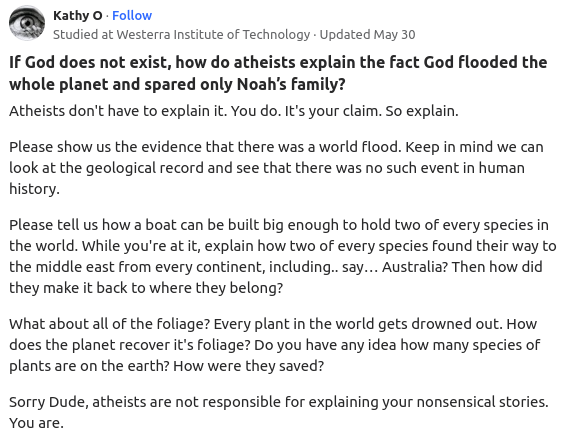
The Problem Of Suffering
Logical Inconsistency: 1) God Is Almighty 2) God Is All Loving 3) Suffering Exists
Suffering Exists: Why?
Here Are A Few Good Quotes








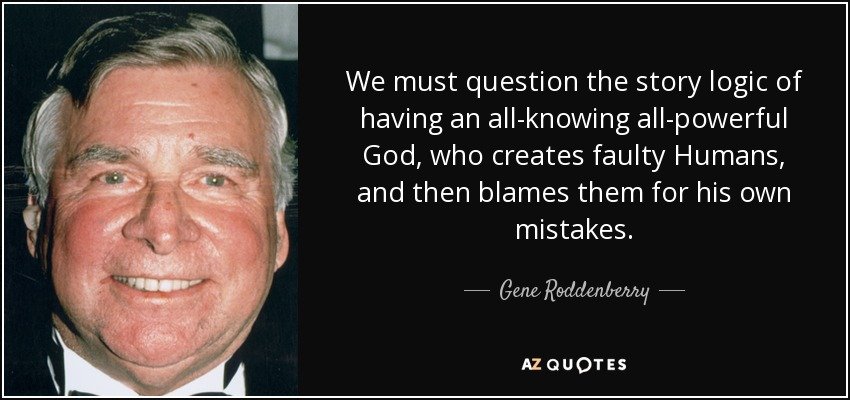

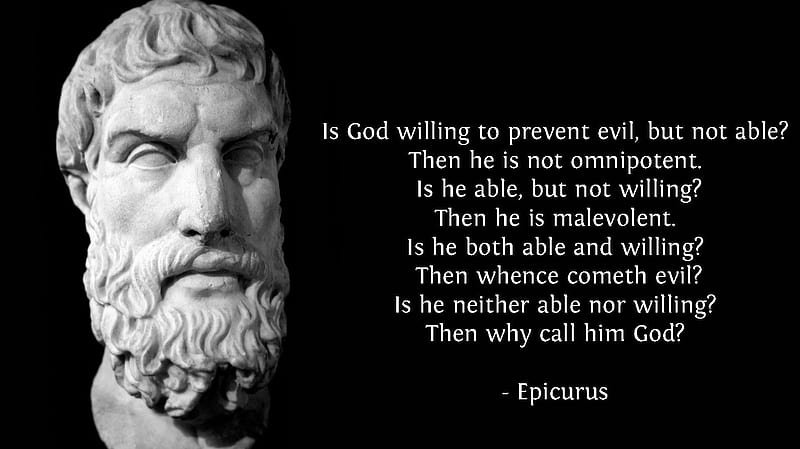

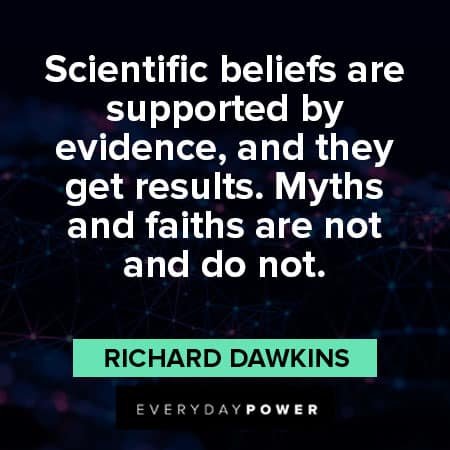


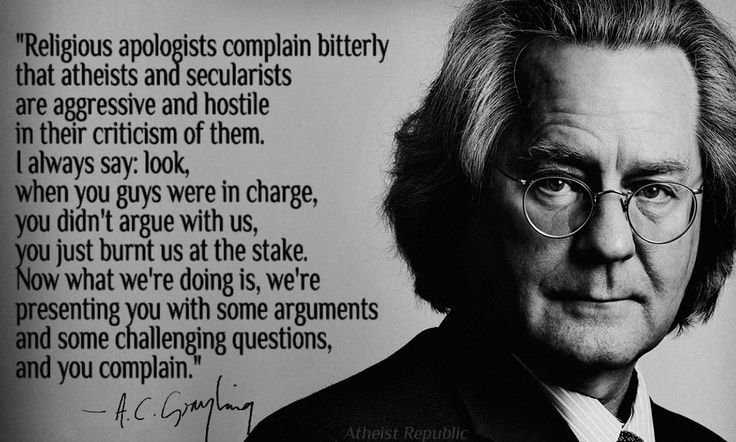




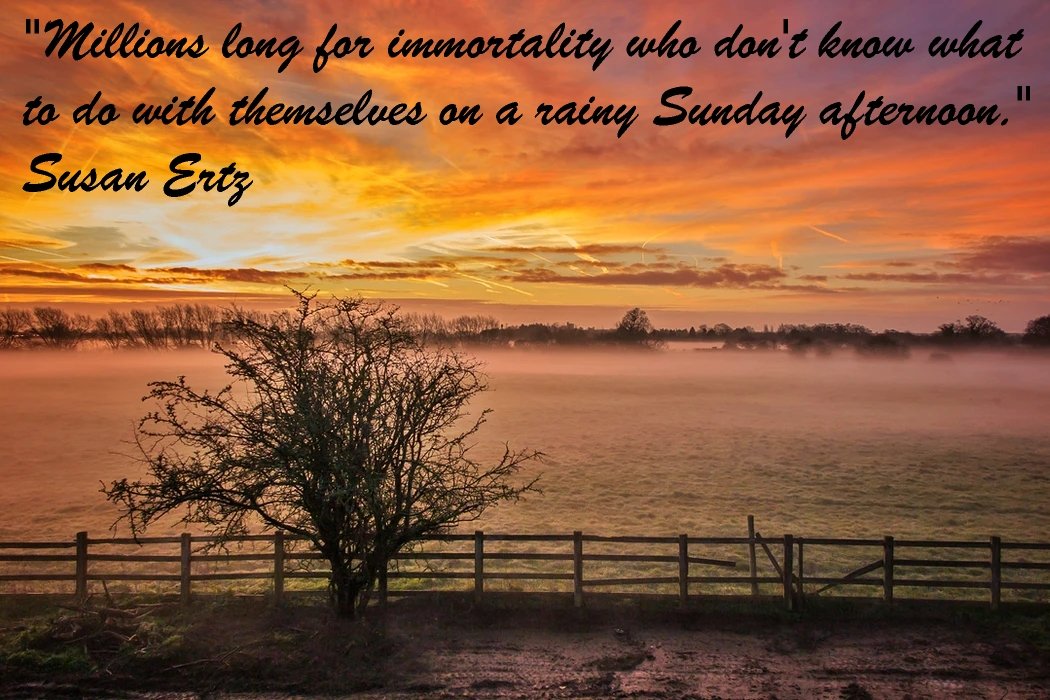

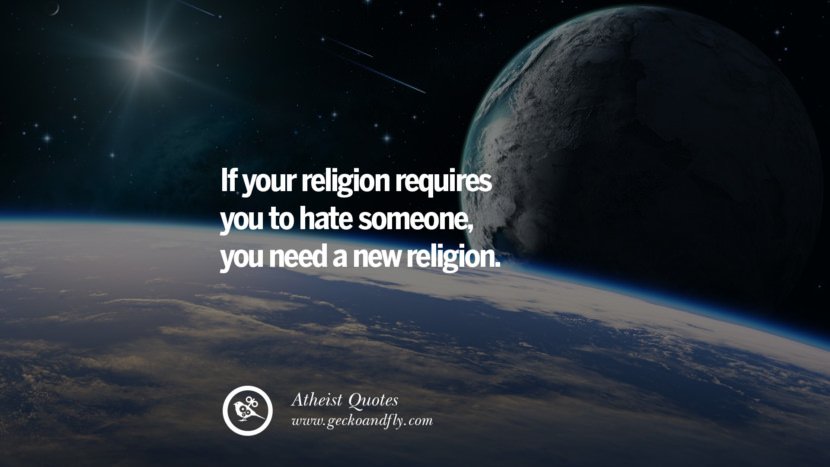


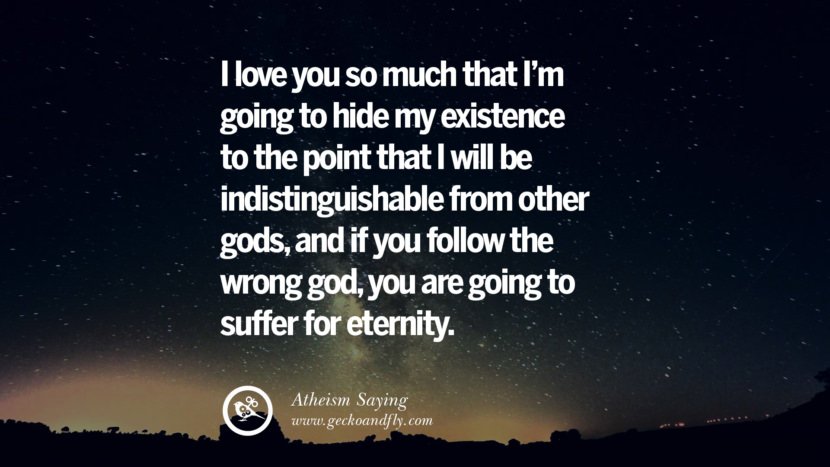




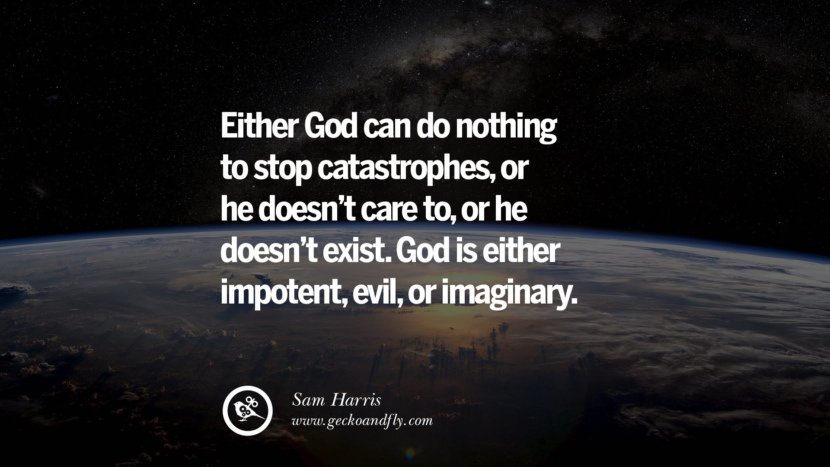
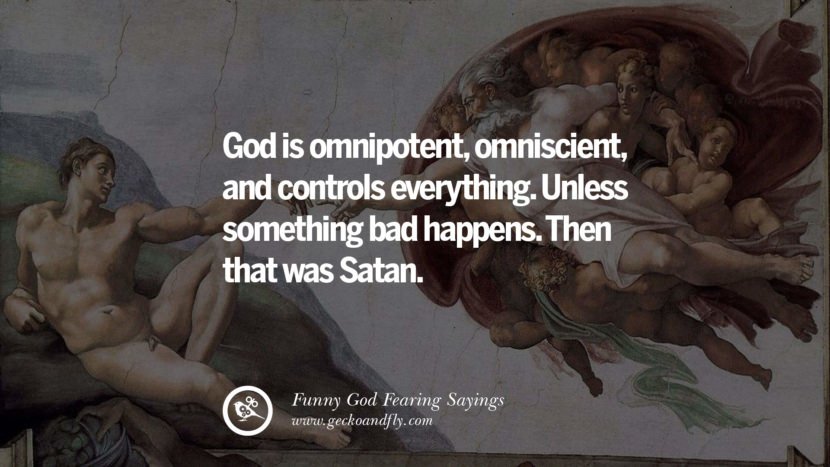








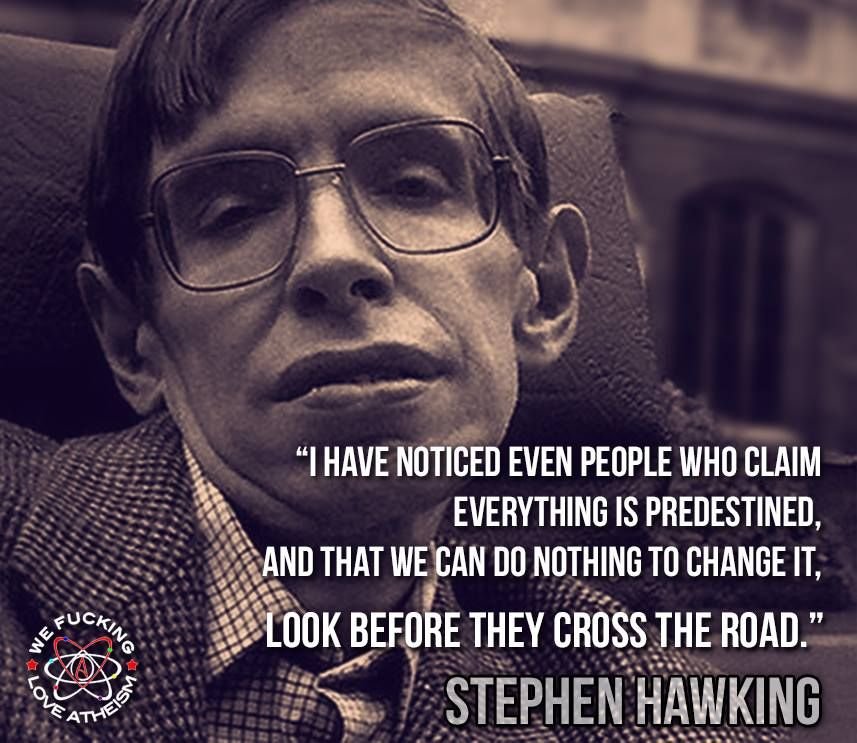



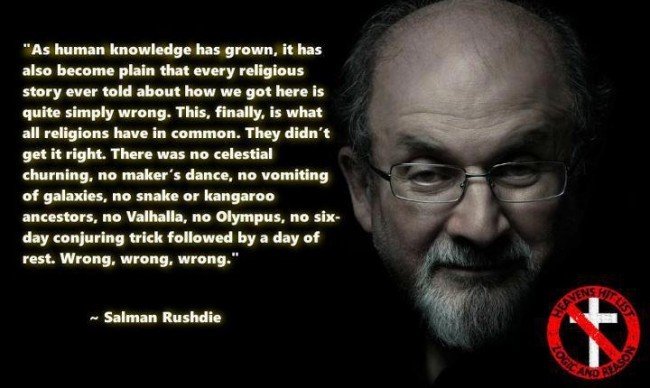

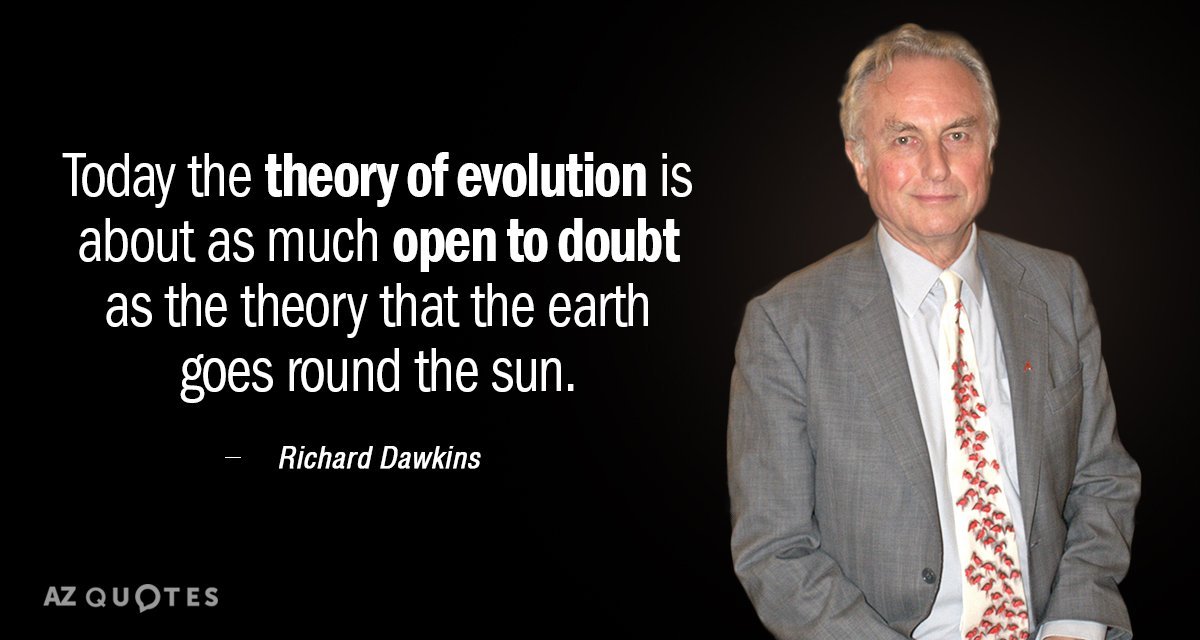

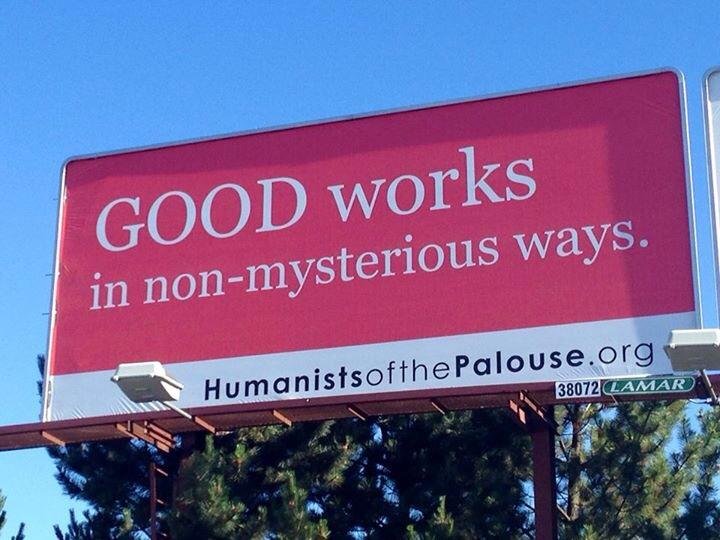


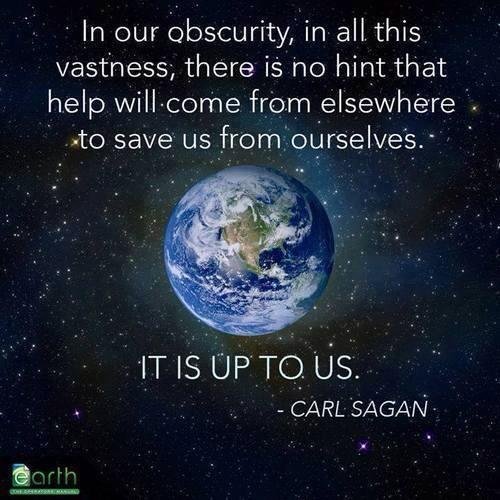
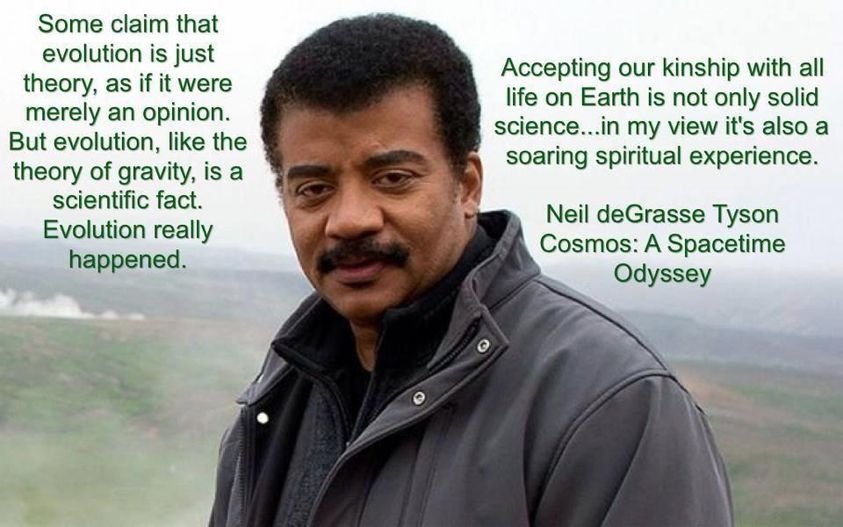


 using WordPress and Kubio.
using WordPress and Kubio.